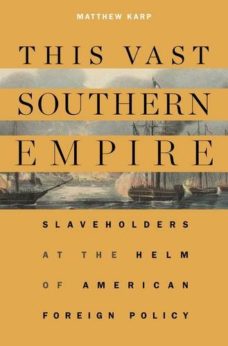
It is often said that history is written by the victors. Arguably, this is to create a cohesive narrative, to tell a story that simplifies and justifies the terrors and traumas of life-changing and brutal conflict. The institution of U.S. slavery, eventuating in the Civil War which left over 600,000 dead and millions wounded, is a case in point.
The former slave masters, their political priorities, ambitions, and policy positions have often been viewed through a blurred lens born of our justified revulsion of human bondage. The fight to free millions of Africans from generations of Southern torture, undoubtedly, lends itself to a desire to simplify and denigrate those who sincerely believed in white racial superiority.
However, by doing so, we risk denying them a level of complexity and sophistication that in the end ill prepares us for a fuller understanding of how they viewed their experiment with slavery – as well as, slavery’s role in the global political economy.
For, in fact, the lords of Southern power were quite ambitious, insightful, intelligent, and resourceful. They had a keen sense of their world-historical mission and viewed their way of life as ascending globally, potentially becoming the dominant social order – if only U.S. foreign policy could be bent to their will.
Matthew Karp’s This Vast Southern Empire: Slaveholders at the Helm of American Foreign Policy is a welcome corrective, adding nuance and depth to our understanding of the South’s global ambitions. It illuminates the latter’s systematic and strategic deployment of its power within the apparatus of the U.S. state in pursuit of its aims.
In the Introduction, Karp writes, “By the middle of the [19th] century southern masters ruled over the wealthiest and most dynamic slave society the world had ever known. If slave labor had an international future, they would certainly command it. Far from isolated reactionaries, crying out against the transformation of the age, proslavery leaders warmly embraced the global dimensions of their struggle. A chief instrument in their endeavor was the foreign policy of the United States.”
Simply put, slaveholders “sought with terrific ambition to command the power of the entire United States – and then, crucially, to use that power in world politics. International in aspiration, slaveholding leaders were profoundly national in operation.”
Karp’s analysis focuses on the decades between spring 1833, which saw the passage in Great Britain of the Slavery Abolition Act, and spring 1861, the beginning of the U.S. Civil War.
Arguably, Old England’s decision to free slaves provided – for the first time – support for abolition from a “great Atlantic power.” For, abolition had “often lacked the economic resources, military might, and naval capacity that only a major state could provide.” As Karp sees it, “The Abolition Act thus represented a literal sea change in the balance of power between slavery and freedom in the Atlantic.” And it was in this context that slave masters decisively decided to wrest control of U.S. foreign policy.
Foremost in their strategy was the necessity to expand and professionalize the navy to better meet abolition’s external threat. The goal was to keep any seafaring Redcoats who might potentially arm the slaves far away from Southern shores.
To Southern elites, the world was “now divided into strategically and ideologically opposing power blocs,” and this threat had to be met with a robust, offensive foreign policy. Following such logic, slave masters sought to ideologically justify their social order as an “inherently dynamic economic institution.” Some even argued that slavery was “a kind of development strategy for the beleaguered nations of Latin America,” exemplified by slaveholding Cuba and Brazil.
What we find in This Vast Southern Empire are pragmatic, shrewd, intelligent, and professional Southern political and military operatives maneuvering domestically and internationally to ensure their way of life. To them, the foreign policy of slavery combined what Karp sees as two critical elements: “Concern for slave property beyond U.S. borders, coupled with a belief in the U.S. government’s ability to protect that same slave property.”
As Karp writes, slavery’s “center of operations, after all, was not Charleston or New Orleans but Washington, at the State Department.” Further, “The chief threat to bondage in the 1840’s came not from northern rabble-rousers but the imperial abolition of Great Britain. To vanquish that threat, slaveholding elites could not act as representatives of a minority regional interest. They had to weld the national power of the United States.” The battle to preserve slavery was not just national, but rather international.
Near the end of This Vast Southern Empire, Karp makes another keen observation. With the election of Abraham Lincoln, slave masters not only feared that they “could no longer control their states, their societies, [or] even their households.” Additionally, they “feared they could no longer manage their empire.” This, Karp argues, was seen as part of the justification for their move toward secession. The slave masters – even during this time of crisis – still viewed their mission as inherently global in nature.
This Vast Southern Empire is a welcome addition to our understanding of how Southern elites not only viewed themselves and their society, but also how they hoped to protect and expand their social order. It is well worth the read.
This Vast Southern Empire: Slaveholders at the Helm of American Foreign Policy
By Matthew Karp
Harvard University Press, 2016, 360 pages










